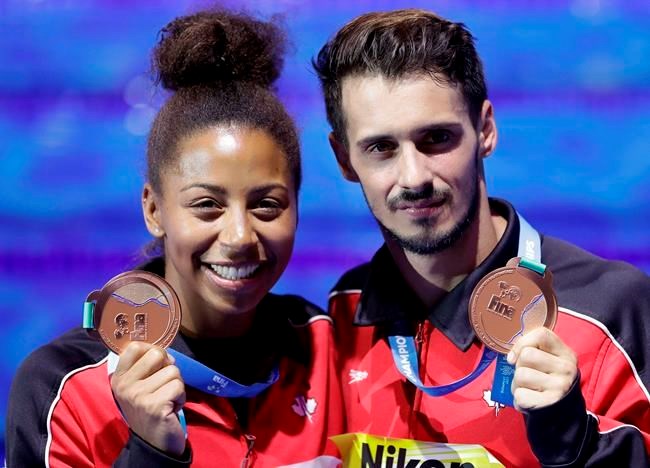TORONTO — It might have seemed like an innocuous gesture. But it was part of a much bigger problem that saw Canadian Francois Imbeau-Dulac lay down some of the best dives of his life at the 2012 London Olympics — and then completely fall apart.
The Canadian diver remembers a particular practice more than a year before the London Games. He and a teammate were walking onto the pool deck when the teammate reached out and pinched some skin on his back. The teammate told Imbeau-Dulac that he wanted "to feel what it was like to be fat."
It wasn't just the one incident. The 28-year-old from St-Lazare, Que., says there are "a bunch of little stories like that I could tell you."
But Imbeau-Dulac began to believe that to earn his spot on Canada's Olympic team, and to be able to compete among the world's best, he'd have to not only improve his technique but the image he portrayed to the judges — from the moment he climbed onto the board.
So he virtually stopped eating. And the best way to hide what he'd later realize was an eating disorder was to eat in front of people and then throw up.
"After the Olympics, I realized I had an issue, but with the adrenalin of the competition and fighting to get my place on the Olympic team, that was the only thing that really mattered to me at that point," he said ahead of Bell Let's Talk Day on Wednesday.
Coaches and teammates were telling him he looked better than ever. Imbeau-Dulac's results told him virtually the same thing. In 2011, he broke Alexandre Despatie's Canadian record in the one-metre springboard event. Then at the London Olympics, he posted the single-scoring dive of the preliminary round on his final attempt to clinch a spot in the semifinal. He missed the final by just one place, a solid result for the young diver.
Then the bottom fell out.
"It was really after the Olympics that I crashed," the St-Lazare, Que., diver said. "That's when I realized that yes, it was a serious issue. I just was tired. I had trouble driving, I had vision issues. I was weaker than ever. I had bruises all over my body. It was just a bunch of physical pain."
He reached out to coach Aaron Dziver and within a couple of days Imbeau-Dulac was working with a sports psychologist.
Imbeau-Dulac is "very happy and very healthy now." He hopes talking about his experience might help someone else who is suffering.
"I think it's very important to talk about it," he said. "My goal was really to help others ... and I'm not just talking about athletes. I'm talking about people in general, in any domain, anybody could eventually deal with a mental issue, and I think talking about it is a great way to open the minds, and hopefully reduce the stigma that there is around mental issues."
Since Bell Let's Talk Day was founded in 2010, there've been more than 860 million interactions, with $93.4 million donated to mental health initiatives.
Even at his lowest point, Imbeau-Dulac said he never considered quitting diving.
"Diving is my happy place, even though it was a rough couple of years," he said." But it was still my happy place, going to the pool and seeing my coach and my teammates was my favourite moment of the day, so I didn't want to stop that."
He had what he called a "beautiful season" last year, punctuated by two national titles in December. His next major competition is the Diving World Series, which opens in Sagamihara, Japan, March 1-3, then moves to Beijing, March 7-9.
Lori Ewing , The Canadian Press




